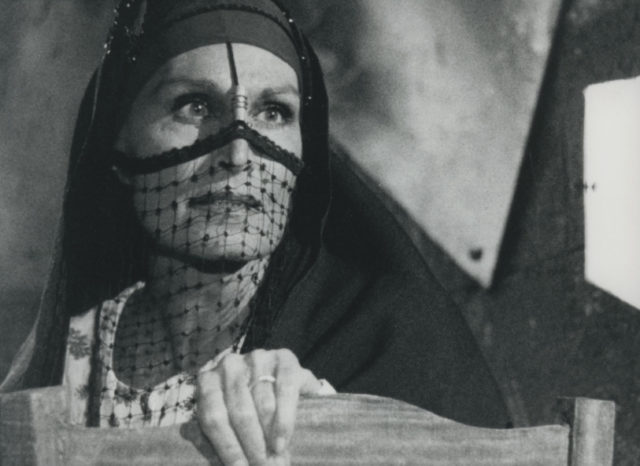‘The Sixth Day’ (Al-Youm Al-Sades) (Youssef Chahine, Egypt, 1986, produced by Misr International Films)
Review by Professor Robert Abrams, Weill Cornell Medicine, New York
Based on the novel of the same name by Andrée Chedid, ‘The Sixth Day’ portrays the raging epidemic of cholera in Egypt in 1947. With its inescapable relevance to the current Covid-19 pandemic, a film produced over three decades ago now has a timely urgency. In this film it is the constant, terrifying presence of death that compels the two principal characters to take hard looks at themselves and discern what in life has enduring meaning for them.
Some explanation is required here. This particular epidemic of cholera had been reputedly carried into Egypt by a post-colonial British occupation soldier. But however the plague actually began, survival in the slums of Cairo has become a grim game of chance. Once infected, patients from all levels of society are picked up by public health squads and unceremoniously dropped into the desert to die without exposing others. It is widely believed that by the sixth day of infection, the illness will either resolve or the stricken person will die.

The stoic, repressed Sadika (Dalida) is a woman determined to bring her cholera-afflicted young grandson, Hassan, away from their infested Cairo neighborhood to beautiful Alexandria. There she hopes to witness, by the sixth day of Hassan’s illness, what she believes will be the curative sight of the sea at the edge of the city. At this point in her life, Sadika is bored and bitter; Hassan is her only joy. She explains to her husband that the smile that occasionally brightens her austere facial expression is “no longer a smile, it is a scar.” But despite her front of indifference, she is distracted by Okka (Mohsen Mohieddin), a virile but juvenile street performer 20 years her junior. Okka loudly proclaims his love for Sadika and puts on exuberant, amateurish, and yet charming Gene Kelly-inspired dance productions with his pet monkey, mostly for audiences of children. There are some wonderful dark-humor lines, for example, when Okka threatens to kill himself 1000 times to demonstrate his love for her, Sadika dryly responds: “Once would be enough.”
Sadika, true to her haunted, stony image, is a woman drawn to suffering. Remote and seemingly untouchable, she has no time or patience for the love-struck antics of an unstable younger man. But Okka manages to follow Sadika and Hassan onto the boat taking them to Alexandria. He knows he will have a captive audience on this voyage.
What ensues on the boat is a rapid-fire conversation—a kind of mutual psychoanalysis– between two people who clearly see through each other’s defenses while remaining clueless about their own. Okka, for his part, challenges the assumptions that have kept Sadika in a constant suffering and angry state. He demands to know why Sadika had taken her now-paralyzed husband back after he’d been unfaithful and not found another man, that is to say, embraced life and not withdrawn from it in order to cling to her grievances? He accuses her, rightly, of feeling aroused by his youthful sexuality but resisting it with harsh repudiations.
Sadika is equally perceptive about Okka. She asks why, if he was as convinced of his talent as he boasted, had he mismanaged his career, losing professional opportunities, only to end up performing to audiences of children? Has this self-sabotage not been a mark of his immaturity and fear? Okka responds with an insightful confirmation—that growing up in a family of many children, he had needed always to make a “splash” to be noticed; and this is a scenario he has been recreating endlessly as an adult, unable to move on from it.
Both characters are now maturing at a rapid pace. As the boat approaches Alexandria, their intense, life-changing dialogue accelerates further. In a moving scene Okka agonizes over whether or not to touch the hand of little Hassan, aware that Sadika would read this as a gesture of courage, but also mindful of the risk to himself. Okka is gaining wisdom and gravitas from Sadika, and Sadika the hope of life beyond tragedy from Okka.
The journey of evolution towards psychological maturity continues for both characters, right up to the first views of the fabled city. But there is an epidemic on, death is all around, and both Sadika and Okka feel that life will no longer wait for them. The scourge has provided each of them with an unexpected opportunity for self-examination, and they are now keen to get on with their lives.
So, it is not the sight of the sea at Alexandria that is curative but the imperative to find love and meaning when life itself is threatened. In an illuminating lesson for our present circumstances, the characters in ‘The Sixth Day’ have resolved to live fully for whatever time remains to them, with or without each other. The final looks of recognition that pass between them create a memorable texture of hope and regret.